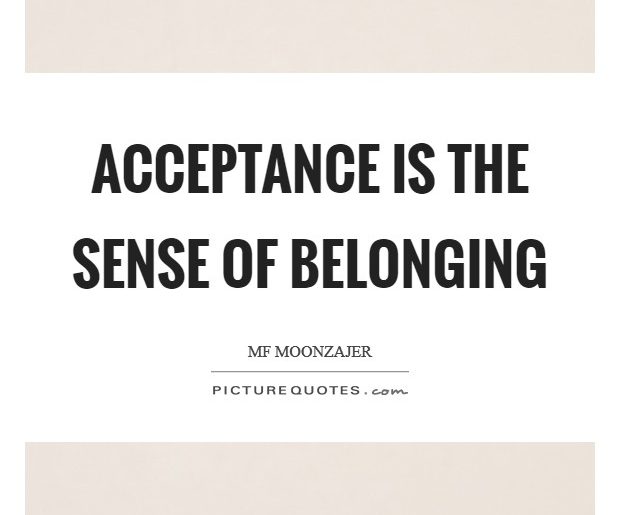A sense of Belonging in its reality is a sense of Acceptance. All humans have an emotional need and desire for belonging and to be accepted–be it our families, our loved ones, friends or even the environment we live. No one wants to feel rejected or be an outcast in society. I definitely would not wish this on anyone, having experienced rejection at times, in certain circumstances by my own colleagues, who must have labelled me–a “different species” or “one of a kind”, not at par with them, no, not even at their level!
Somehow, there exists in human nature, an inevitable and a strong sense of belonging–in our environment, our families, communities, workplace and in our own society. Regardless of our choice or the choice of others, to belong or not to, can occur subconsciously or selectively in our minds. Although, we may not have the same lifestyle or interests, yet we do want to fit in and be accepted… somehow, sometime, somewhere.
Imagine, if you were to find yourself in a place or surroundings, even in a situation you are unfamiliar with and unknown, what is your reaction? Whatever it is, just don’t panic, don’t consider taking flight, don’t even stress yourself! Keep calm and be rational, try to identify the environment around you, your location and assess the people you see, for any familiarity or recognition, then learn to assess the situation differently and mentally. If you had a GPS, which is a Global Positioning System in your smartphone, it would serve you well to your advantage–thanks to smart technology! What if you happened not to have one? Then do what comes naturally, make enquiries for help.
Such a fundamental value, is belonging to mankind, that we would feel so lost without it! This desire to belong, is so universal, that the need is found in all cultures, all races and all types of people everywhere. Even animals in the animal kingdom, do feel the same way… a sense of belonging!
The need to belong and to be accepted is a major source of human motivation–like it or not! Does it surprise you that human culture is compelled and even conditioned by pressure to belong? This need to form attachments or relationships, is a universal response among us, as we are driven naturally towards establishing and sustaining relationships in our sense of belonging and acceptance. The quality of interactions we make is more vital than the number of interactions we express.
Suggestively, it is said that people who lack belonging, are prone to behavioural problems and suffer from increasing mental and physical illness, as compared to those who are welcomed, accepted, who feel positive, calm and are happy. When we are rejected or excluded in society or among our groups, automatically we have negative emotions and resentment–leading to envy, depression and even grief. Social rejection can be so intense that it causes psychological pain. Hence, it is more appropriate to regard belonging and acceptance as a need, rather than a want.
How do we enhance or improve our sense of belonging and acceptance? By observation, we can learn what to do and how to apply it effectively by means of:
- Self-regulation – When our belonging needs are not met, self-regulation is necessary to fulfill our needs to belong and be accepted. We define it as a process of regulating oneself or changing one’s behaviour in many different ways. We can self-regulate by looking to others for guidance, regarding where to focus attention. It includes impulse control and allowing someone to manage impulses that are short-term and to have a heightened sense of belonging within an in-group.
- Peer Networks – Where communication expands from childhood into adolescence, peer group membership eventually develops. In order to fit in and belong, adolescents will always conform to activities of a particular group, by participating in similar activities as members of a peer group. In this way, they learn to conform and be accepted.
- Workplace – It is where the need to belong is more evident. As students want to fit in their school, so likewise, employees desire to fit in their workplace. They want to seek approval from their bosses and colleagues–just to be accepted. Leaders who are inspirational and self-confidant, inspire their subordinates to exceed expectations, working for a collective group rather than their own self interests. This in turn provides employees with an identity, in which they belong.
- Conformity – It is the act of changing one’s actions, attitude, and behaviour to match the norms of others. The inclination to conform, often results from direct or indirect social pressure, that occurs in societies and in small groups. Those who are able to conform, are more likely to gain the approval of others, build relationships and even enhance their self-esteem.
- Culture – The need of belonging is prevalent in all cultures. Hence, for culture to eradicate this need & make it irrelevant, is mission impossible, no matter how people express and satisfy their needs. In some countries, people strive to fit in and belong, so much so, that being shunned and isolated from their community or society–is the greatest dishonour!
Thus, knowing that we belong somewhere, somehow, some time–in our homes, our families. our communities, our countries and in society; among our loved ones, friends, colleagues and neighbours… is knowing that Acceptance is the Key to social interactions and relationships.
Know that the need to belong is the need to give and in return–to receive attention, too and from others. Without belonging, we cannot identify ourselves, hence we would have problems in communication and in relating to our surroundings. When we find our Sense of Belonging and Acceptance, we are at peace with ourselves and with one another, including our environment.
Article Source: http://EzineArticles.com/9344934




